Comet baseball's best-ever season!
'Cohesive' team wins regular-season, conference and progresses to NCAA DIII Regional
COVID variant spreads from India
UTSW researchers discuss concerns, measures to avoid youth exposure

UT Southwestern researchers have identified several cases of the highly infectious COVID-19 variant from India in North Texas.
Since the beginning of the pandemic, UT Southwestern has been conducting tests on COVID-19 specimens through whole-genome sequencing, which allows researchers to identify viral diseases and mutations that are found in the genetic material of a human cell.

As COVID-19 cases in India rose, the researchers identified a new strain while conducting these sequencing tests at their laboratory in Dallas. This variant – known as the Delta variant by the World Health Organization –is the B.1.617.2 strain, and it is causing a second surge of COVID-19 in India.
Assistant Instructor of Pathology at UT Southwestern Jeffrey SoRelle said the Delta variant has a much higher transmissibility than other variants. This can be seen through the rise of the Delta variant in the United Kingdom.
“In Great Britain, 100% of cases were from the Alpha variant. While the country had cases of Beta and Gamma variants, only this Delta variant has risen in prevalence, now overtaking Alpha variant as the most common,” SoRelle said. “The main issue appears to be 50% increased transmissibility compared to the already more transmissible Alpha variant.”
Both UT Southwestern and the WHO have listed the Delta variant –first identified in India in December of 2020 – as a variant of concern due to its increased transmissibility. This variant still poses an increased risk for unvaccinated individuals, including those who do not wish to take or cannot take the vaccine due to healthrelated concerns and children under the age of twelve who are not yet authorized for immunization.
“The Delta variant does not show evidence of vaccine or immune resistance,” SoRelle said. “Laboratory studies and clinical evidence now indicate vaccines protect against the Delta variant.”
While vaccines are shown to protect against this variant, 3% of all current COVID-19 cases in the US are of the Delta variant. In Dallas County, there have been a total of six Delta variant cases.
Because children under 12 are not yet eligible for the vaccine, it’s important to keep following CDC guidelines regarding COVID-19 to prevent young children from getting the disease. SoRelle said to also take certain safety precautions if you have traveled to a country with high numbers of the Delta variant.
“If you have recently traveled to an endemic area such as India, you should self-quarantine for 10-14 days and get tested during this time,” SoRelle said. “If you have come into contact with someone who has traveled in an endemic area, you should monitor for symptoms and consider COVID-19 testing.”
TYLER BURKHARDT Editor-in-Chief
Returning from a season prematurely canceled by COVID-19 with a vengeance, the 2021 UTD Baseball team put together their best season in 20 years of existence, winning both the regular season and the American Southwest Conference (ASC) Championship.

Head coach Shane Shewmake said that it’s the first time the team experienced such a dominant season. “We won the Conference Championship in 2018 but did not win the division in the regular season, and the year we did win the division, we didn’t win the championship,” he said.
After cruising to a 19-7 league record in the regular season, the Comets went undefeated in the ASC postseason, securing both the championship
and a berth to the double-elimination
NCAA DIII Regional preliminaries for the College World Series, where they would put up a strong showing but take an early exit after their third game.
The team accrued its fair share of accolades this year, including tying an NCAA DIII record for grand-slams in a season with nine to landing five students – Carter Cochrane (P), Ramon Garza, (2B), A.J. Liu (OF), Jacob Perry (OF) and Daniel Zamora (DH) – on the American Baseball Coaches of America (ABCA) DIII All-Regional teams. Perry would also become the first-ever Comet awarded an NCAA DIII ABCA/Rawlings Gold Glove award for his outstanding defense in the outfield. But Shewmake said that the team’s greatest strength wasn’t their individual players; rather, it was the cohesion
New mask guidelines
with which they played as a team.
“This team was very well-rounded: they could hit a little bit, they could pitch a little bit … and on-paper, we’ve had teams that were as good or better as this team, but they just gelled real well,” Shewmake said. “They liked each other, they pulled for each other, and it shows: that’s really what separates them.”
Finance graduate Ramon Garza echoed Shewmake’s sentiment, pointing to the “selfless” fashion in which they played the game.
“One of the things this team had was great team chemistry; we were just a group of guys who enjoyed being around each other,” Garza said. “The guys didn’t care whose name was up there, or who got credit for what. It was about winning as a team and making sure UT Dallas is rep-
resented in the best way possible, both on and off the field.”
Garza also attributed a large portion of their success directly back to the coaching staff.
“I would argue that we have the best coaching staff in the ASC,” Garza said. “Our coaching staff is phenomenal. They set a standard for us since the beginning of the year: our goal was to go out and win a Conference Championship, that’s the standard that was set, the standard we tried to practice and play to, and that’s the position they ultimately brought us to.”
Business administration senior Carter Cochrane said the team’s success is all the more impressive because it came amidst one of the craziest sports seasons in Comet
Following Governor Greg Abbott’s Executive Order GA-36, UTD and all other schools in the UT system will no longer require individuals on campus to wear face masks.
Mask-wearing is now voluntary everywhere on campus except for the Davidson Gundy Alumni Center, which is still running a COVID-19 vaccine clinic. However, Vice Presi -
dent and Chief of Staff Rafael Martín said after the clinic closes on July 6, the Alumni Center will join the rest of campus in not requiring masks. While face coverings are no longer mandatory, Martín said that completing the Daily Health Check still is for unvaccinated Comets coming to campus. The procedures for the Daily Health Check remain the same as the previous two semesters – that is, individuals must specify whether they are
visiting campus that day and if they are experiencing COVID-19 symptoms via a secure text or email link. Fully vaccinated Comets can opt out of the Check two weeks after reporting their status on the Voluntary Vaccine Reporting Form.
“We [are] assessing right now kind of how we will try to implement that in the fall when obviously we'll have many, many more students who will be coming to campus,” Martín
said. “As it stands right now, for those students that do not self-report their vaccination status, we will require them to complete the Daily Health Check in the fall semester.”
Martín said he encourages all Comets to follow CDC guidelines, which say unvaccinated individuals should wear masks when near others, and vaccinated individuals do not necessarily
Women's doubles tennis team makes historic run
Samantha Wong and Kathy Joseph make UTD's deepest run into the NCAA DIII playoffs in any sport
LAUREN DOUGHERTY Life & Arts Editor
Women’s tennis players Samantha Wong and Kathy Joseph made UTD sports history by ending their 2021 season with a semifinals finish at the NCAA doubles championship.
The pair was one of just 16 chosen to play in the national competition and the second duo ever sent by UTD.
According to a UTD sports article, Joseph and former teammate Sindhu Ravula made the 2019 doubles tournament, losing in the first round.
Wong said that the pair likely would not have qualified without key wins in a few regular-season matches that allowed them to keep their ranking.
Normally, the top four doubles pairs in each region qualify for the tourna -
ment, but because of COVID, only the top two were selected this year.
“We were both fortunate enough to be playing really well, and we were such great doubles partners,” Wong said.
After a tough first match that was interrupted and forced onto an indoor court by rain, the duo hit their stride with the second match, Wong said. She was nervous for the semifinal match against a pair from Emory –the school that had just won the team championship.
“I just had the mindset to play my game and just do our best, and it’s a little frustrating honestly that we didn’t pull through, because. . .I felt like [we] had our chances,” Wong said.
Head coach Bryan Whitt said that he didn’t know until fairly late in the season that Wong and Joseph had a
chance to make the tournament. With limited match opportunities due to COVID, the regional rankings were hard to predict. However, from a skill level standpoint, the pair’s ability to make the tournament was no surprise.
“You could be a very good singles player, and it may not necessarily translate directly to the doubles game because there’s different skills needed. But fortunately, both Kathy and Samantha are very comfortable in that,” Whitt said. Joseph and Wong’s run was the furthest ever by a UTD student-athlete in any NCAA sport, Whitt said. While it’s difficult to compare the results of an individual tournament to that of a team sport like soccer or basketball, their success increases the appeal of the tennis program.
“That kind of puts in context how
well they did do,” Whitt said. “If a high school student thinks they want to go to a Division III school, and then they see that we’re competing at that level, that certainly adds to the marketability.” Joseph was also selected to compete in the singles tournament, in which she advanced to the semifinals. She could not be reached for comment.

THE MERCURY | UTDMERCURY.COM June 28, 2021 facebook.com/theutdmercury | @utdmercury
PALAK DAVE Mercury Staff
FATIMAH AZEEM Opinion Editor
JUHI KARNALKAR MERCURY STAFF
ALONZO QUINTERO | COURTESY
The UTD Baseball team, after winning their second ASC Championship on the backs of a 35-18 season which saw them go 20-8 against conference opponents.
ASTRID HERNANDEZ| MERCURY STAFF
COMET SPORTS | COURTESY Coach Bryan Whitt has led Comet tennis teams to 5 ASC titles.
Face coverings no longer mandatory on campus SEE MASKS, PAGE 6 SEE BASEBALL, PAGE 6
Tyler Burkhardt editor@utdmercury.com
Managing Editor Ben Nguyen managingeditor @utdmercury.com (972) 883-2287


Copy Editor Sophie Boutouis copyeditor@utdmercury.com
Graphics Editor Alesandra Bell graphics@utdmercury.com

Photo Editor Anna Phengsakmueang photo@utdmercury.com
News Editor Nandika Mansingka news@utdmercury.com
Life & Arts Editor Lauren Dougherty life@utdmercury.com
Web Editor Trevor Tomer web@utdmercury.com
Outreach Editor Jacky Chao media@utdmercury.com
Opinion Editor Fatimah Azeem opinioneditor@ utdmercury.com
Contributors Palak Dave
Astrid Hernandez Juhi Karnalkar Angela Li Quinn Sherer Aishni Shrivastava Jimmy Teeling
UTDPD Blotter
May 18 • UTD
PD captured four individuals on camera taking a UTD golf cart unauthorized between the hours of 9:30am and 11:00 a.m. near the Bioengineering Science building.
June 1 • UTD PD was informed by a student about damage to their parked vehicle, which occurred around 8:00 p.m.
June 8 • An unidentified male fled the scene after taking University cart 48 without permission and colliding it into a stone wall on campus at 3:45 p.m.
June 14
• An unaffiliated male was charged with theft of property at 12:33 a.m. on campus.


The Mercury is published on Mondays, at two-week intervals during the long term of The University of Texas at Dallas, except holidays and exam periods, and once every four weeks during the summer term. Advertising is accepted by The Mercury on the basis that there is no discrimination by the advertiser in the offering of goods or services to any person, on any basis prohibited by applicable law. The publication of advertising in The Mercury does not constitute an endorsement of products or services by the newspaper, or the UTD administration. Opinions expressed in The Mercury are those of the editor, the editorial board or the writer of the article. They are not necessarily the view of the UTD administration, the Board of Regents or the Student Media Operating Board. The Mercury’s editors retain the right to refuse or edit any submission based on libel, malice, spelling, grammar and style, and violations of Section 54.23 (f) (1-6) of UTD policy. Copyright © 2017, The University of Texas at Dallas. All articles, photographs and graphic assets, whether in print or online, may not be reproduced or republished in part or in whole without express written permission. THE MERCURY UTDMERCURY.COM Volume LV No. 55 Media Adviser Chad Thomas chadthomas@utdallas.edu (972) 883-2286 Mailing Address 800 West Campbell Road, SU 24 Richardson,
Newsroom Student Union, Student Media Suite SU 1.601 The Mercury is a proud member of both the Associated Collegiate Press and the Texas Intercollegiate Press Association. Editor-in-Chief
TX 75080-0688
(972) 883-2294
LEGEND VEHICULAR INCIDENT THEFT DRUGS
ALCOHOL OTHER
&
A D C
June 28, 2021 | The Mercury NEWS 2
B A D
A B A D C
GOP legislative priority analysis
JIMMY TEELING
Texas GOP lawmakers passed most of the carryover priorities from the 2019 legislative session. However, it is disappointing that they could not finish passing the new priorities they set for this year and must save those leftovers for a special session.
In 2020, the Republican Party of Texas passed eight legislative priorities for the 2021 legislative session: election integrity, religious freedom, abolition of abortion, constitutional carry, monument protection, banning child gender modification, school choice for all and banning taxpayer-funded lobbying. When the session ended in May, our lawmakers had only managed to pass bills relating to the first five of those priorities.
Nevertheless, the Texas GOP secured three major wins this session, most notably Constitutional Carry, which conservative activists have been pushing for years. Following concerns that Lieutenant Governor Dan Patrick would not allow a vote on the Senate floor, Constitutional Carry was passed by both chambers and signed into law by Governor Greg Abbott. The bill, which allows law-abiding gun owners to carry a handgun without a license, is a major step in the right direction for preserving our Second Amendment rights and puts Texas on par with several other conservative states.
The legislature also took steps to protect churches from being forced to close, as happened in Harris County near the start of the coronavirus outbreak.
HB1239, authored by McKinney Representative Scott Sanford, sponsored by Senator Angela Paxton and now signed into law by Abbott, prohibits the government from closing places of worship in Texas. SJR27 takes this a step further, proposing this law be enshrined in the Texas Constitution. Texans will have the opportunity to vote in support of this constitutional amendment this November.
The last major achievement of Republicans this session is passing the heartbeat and Roe v. Wade trigger bills. These bills, now signed by Abbott, protect the unalienable rights of children who cannot protect their liberties themselves while also rightfully protecting mothers from punishment. The heartbeat bill prohibits physicians from conducting an abortion if they can detect the child’s heartbeat, with appropriate exemptions. The Roe v. Wade trigger bill, on the other hand, would ban abortion from conception until birth if the U.S. Supreme Court overturns Roe v. Wade. This bill also establishes criminal penalties up to a first-degree felony for physicians performing abortions; however, penalties established by both laws only apply to the physician conducting the abortion, not the mother.
Despite these victories, many conservatives left this session feeling sour due to several other important priorities dying this session. The most extreme example of this is SB7, the Senate’s omnibus election integrity bill. This 67-page bill – deemed by President Joe Biden to be “unAmerican” and “an assault on our democracy” – encapsulated Republicans’ most sweeping election integrity laws this session. SB7 died in the House due to a disappointing walkout staged by House Democrats,
FATIMAH AZEEM Opinion Editor
“Our Creator endowed us with the right to life, and yet millions of children lose their right to life every year because of abortion,” Texas Governor Greg Abbott says as he signs Senate Bill 8 (the Heartbeat Bill) into Texas law. In doing so, he maintains his stay on the list of politicians who have used God as a justification for passing oppressive policy.
The bill at hand bans abortion as soon as a fetal heartbeat is detected, which generally occurs five to seven weeks into a pregnancy – before or around the average time women begin to learn they’re pregnant – and makes no exceptions for rape. The law will take effect in September, with private citizens expected to enforce it instead of the government. These citizens can sue abortion providers and those who assist with the procedure, even if they are not personally affected by it.
Abbott’s reasoning for signing SB-8 is entangled with an appeal-to-faith fallacy in which he equates what is godly with what is lawfully correct. While there are times when religious stipulations might align with secular principles, the two aren’t necessarily linked, so it is safest to keep faith out of policymaking. Laws exist to govern all Americans – some of whom are not religious or do not even believe in God – so justification for laws should use rationale from existing legal principles and be as objective and unbiased as possible.
SB-8, however, goes against this by violating Supreme Court rulings and principles of the legal system. It breaches Roe v. Wade and Planned
Religious appeal of SB-8 masks its ineffectiveness
Parenthood v. Casey – which give women the constitutional right to an abortion without excessive government restriction – and is hypocritical in the sense that under the bill, private citizens are free to sue abortion providers simply if they’re unhappy with their practices, but abortion providers would need to incur tangible harm from the bill to sue the government. Abbott’s appeal-to-religion fallacy also masks the reality that the bill likely won’t even effectively reduce abortion rates. The women who seek out abortions aren’t doing so because they enjoy it; it’s a last necessary resort, and restricting access to it won’t reduce the demand for it – it’ll just make abortion less safe as women seek alternatives. For abortion rates to actually decrease, the legislature needs to address the underlying causes. A study published by the Guttmacher Institute said there was an estimated 7% reduction in national abortion rates from 2014 to 2017 when women had more access to affordable long-acting birth control. Similarly, a study from the Washington University School of Medicine showed a significant drop in abortion rates from the national average, when the nearly 10,000 participants in the study had access to either short or long-acting birth control. Despite evidence that access to affordable contraceptives helps decrease abortion rates, Texas – which has the ninth highest teen birth rate in the country – is one of only two states in the nation that doesn’t cover birth control on children’s health care plans. Texas also places a higher priority on teaching abstinence-before-marriage (which, like SB-8, has a basis in religious
ideology) instead of contraceptioned in sexual education, even though the latter is demonstrated to be more effective in preventing unplanned pregnancy. Accessible contraceptives and comprehensive sexual education are supported ways to help reduce abortion rates, not a heartbeat bill, which serves to harm women and help no one.

Religion shouldn’t be the only metric of sound policy, and SB-8 fails to stand on its own merits under any other standard. While the Heartbeat Bill is
Heartbeat bill: heartless and fruitless Tiktoxic by design
now a part of Texas law, it doesn’t have to remain that way. The most practical course of action to take against SB-8 would be to donate, raise money or advocate for legal agencies and interest groups that can challenge SB-8 in court and represent plaintiffs who can’t afford attorneys. Organizations able to fight SB-8 on the legal front include NARAL Pro-Choice Texas and Texas’s American Civil Liberties Union. By empowering the organizations that can fight the Heartbeat Bill, overturning SB-8 can become a reality.
On the surface, TikTok seems like a harmless way to pass time and learn convenient life hacks, but there’s actually much more to the app than just lip-syncing and DIY videos. Many users are oblivious to the platform’s complex algorithm and the negative impacts it can have on the app’s vast audience.
Over the past year, TikTok has taken the world by storm, specifically among young adults.
In fact, by 2019 60% of active users were aged 16-24 years old.
TikTok can attribute a large portion of its success to its For You page, which has been a point of attraction for many new users due to its accuracy in showing us what we like to see. Getting on a viewer’s For You page has been esteemed the “holy grail” of success for TikTokers, so it makes
sense to wonder: what clips have the best chance of getting on the For You page?
Surprisingly enough, the quality of content doesn’t actually play as big of a role as we would like to think. Rather, the page's composition is more dependent on a factor that is out of our control: looks. TikTok notably employs the use of an elaborate artificial intelligence network that is able to quantify attractiveness. It does this by initially inputting a standard or “perfect” face into the algorithm and assigning ideal scores to 86 distinct facial points. The faces of those appearing in the TikTok clips are then compared to the ideal features and given a score using artificial intelligence. Greater attractiveness is classified as “high quality content,” which is what eventually gets recommended to others.
In addition to perpetuating insecurities based on facial

features, TikTok is notorious for promoting unhealthy physiques.
We’ve all most likely heard of the “What I Eat in a Day” videos, where exceptionally fit creators eat impossibly small portions of food (typically amounting to under 1200 calories) and instill unrealistic expectations in viewers. As users continue to watch these clips on a daily basis, a toxic diet culture and selfdegrading statements become ubiquitous, where young people post negative comments about themselves under posts made by attractive creators. In this way, TikTok inconspicuously builds a superficial world for its users that clearly has the potential to harm a young audience. But TikTok isn’t all bad, and it does have some notable benefits. To start, it’s generated some of the most political participation and awareness among teens that we’ve ever seen. It’s also been a
source of comfort for many of us who have been stuck inside our homes for the past year, desperate for entertainment with humorous and informative videos from the app.
TikTok has a dark side just like any other social media app. Unfortunately, its beneficial qualities have been largely overshadowed by dangerous competition regarding a person’s looks. This competitive spirit understandably resonates with both watchers and creators, breeding a suffocating environment of insecurity. It’s high time for TikTok to take responsibility and eradicate the algorithm that prioritizes attractiveness over quality of content by implementing better content filtering measures that will begin to break the cycle of unhealthy insecurity that is so
June 28, 2021 | The Mercury OPINION 3
Mercury Staff
AISHNI SHRIVASTAVA Mercury Staff
ASTRID HERNANDEZ | MERCURY STAFF
Manipulative content-curation makes
SEE PRIORITIES PAGE 6
Session ends with wins, lost chances for the GOP
platform a net-harm
SEE TIKTOK PAGE 6
QUINN SHERER| MERCURY STAFF




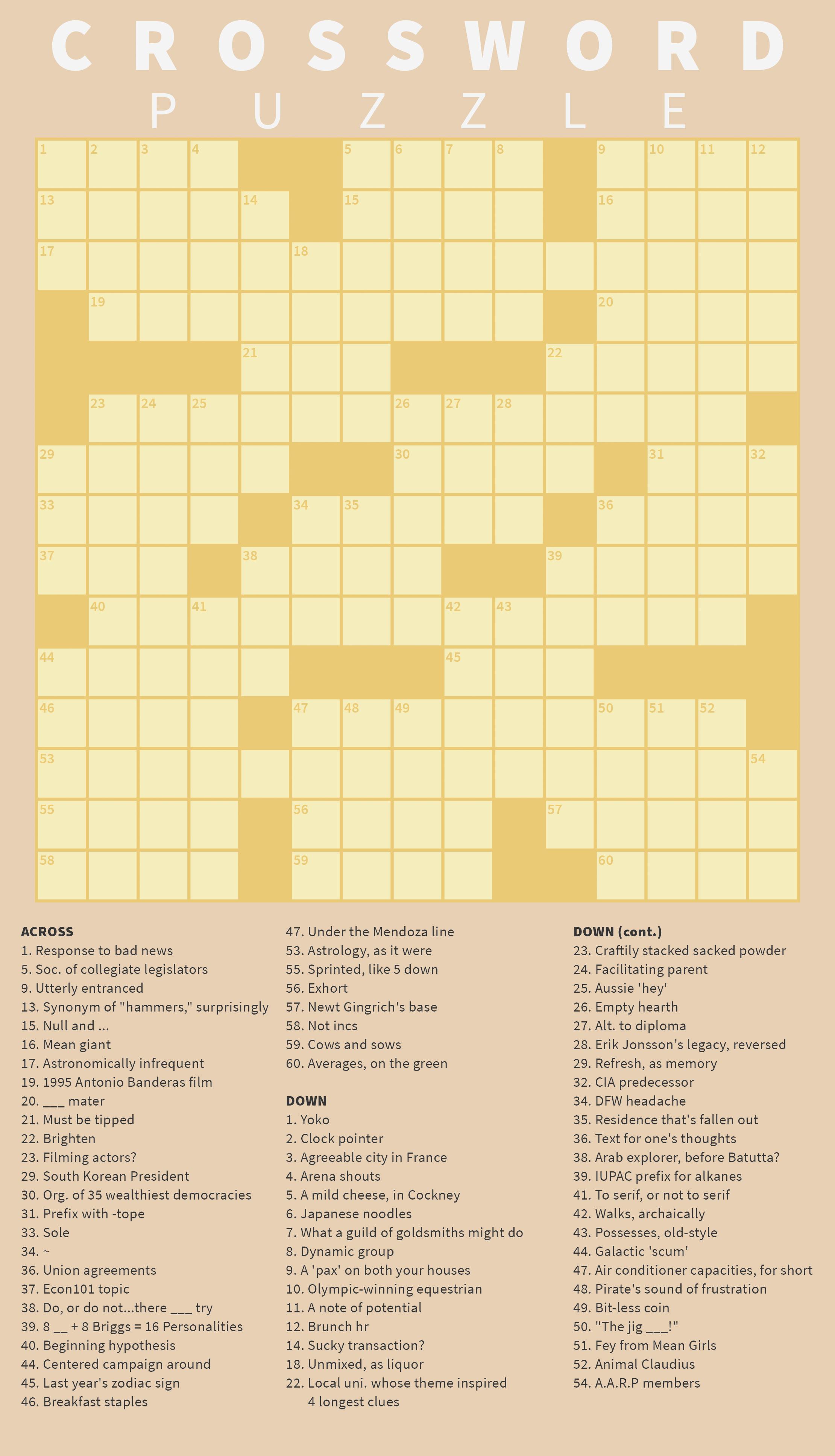

COMICS&CROSSWORD 4 SUMMER ACTIVITIES BAD OMEN LOVE FOR MY LADY CROSSWORD LOVE NOT QUINN SHERER | MERCURY STAFF ASTRID HERNANDEZ | MERCURY STAFF JACKY CHAO | MERCURY STAFF TYLER BURKHARDT | EDITOR-IN-CHIEF ANGELA LI | CONTRIBUTOR JUHI KARNALKAR | MERCURY STAFF June 28, 2021 | The Mercury
UP and COMING in the DOWN times
The SP/N gallery's current exhibit includes works of all mediums from local community college students, featuring the creative expression that several promising young artists have fostered during the pandemic. The exhibit will be open until July 17 and can be experienced both in person and virtually.


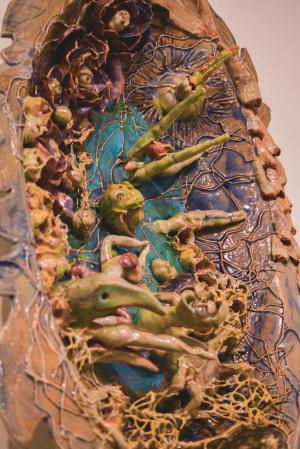
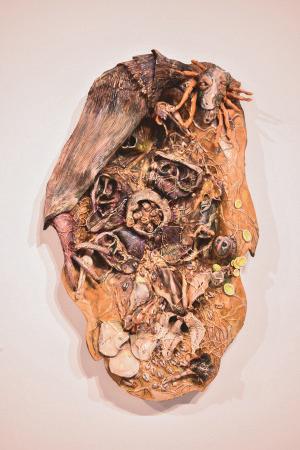
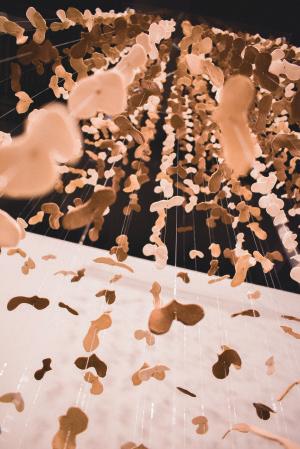

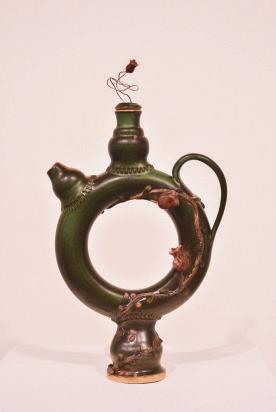
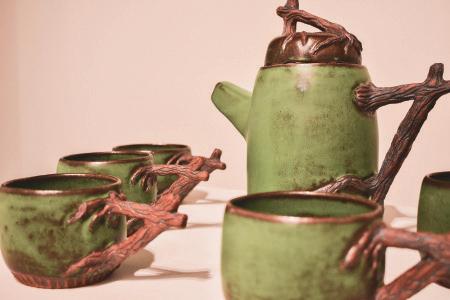
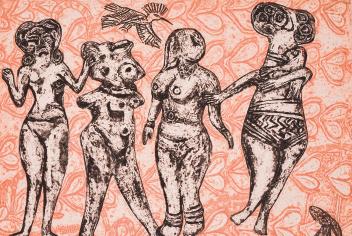


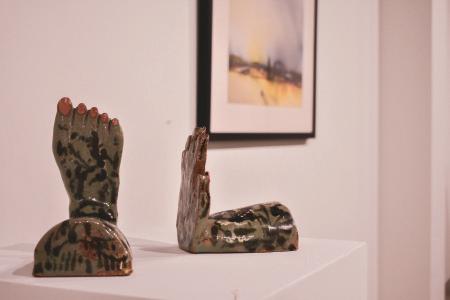
June 28, 2021 | The Mercury LIFE&ARTS 5 ANNA PHENGSAKMUEANG | PHOTO EDITOR
history. The possibility of cancellation remained throughout much of the offseason, COVID precautions were in full effect throughout the year – one positive test on the bus would knock out the entire team for two weeks – and Texas’ polar vortex in February canceled the first seven games of their schedule. He said that as next year returns to presumably more normal circumstances, the team would love to see fans in the stands.
“I know this year it was hard
for everyone to come out with COVID restrictions, but I fully expect the baseball games next year to be even more intense than this year, and we feed off the fans,” Cochrane said. “So if y’all ever want to come out and support us, we’d really appreciate it.”

Next year’s outlook is strong as well, as, under the NCAA rules that extended eligibility to account for the canceled 2020 season, students who otherwise would’ve been seniors this year can opt to return for another year of play. While Cochrane said that the team is looking to
return its entire starting lineup, Shewmake said that they’ve also had some promising recruits to bolster their ranks. Garza, however, acknowledged the need to continue to put in the work to achieve that potential.
“One of the things is we don’t want to get comfortable. The work that we did to get to the point where we are over the past year doesn’t just magically carry over: you’ve got to put in twice the amount of work to be successful two years in a row,” Garza said. “There’s definitely a target on our back next year, but we are going to take it one game at a time and
know that if we play our game, we’re capable of doing some good things out there.”
As defending Conference Champions, UTD is the team to beat, and despite their successes so far, these Comets don’t plan to rest on their laurels.
As Shewmake said, “we have the chance to go win another conference championship next year, and those guys that are coming back, that’s their expectation. That’s our goal: win the Conference Championship, go win that [NCAA] Regional Tournament, and play for a National Championship.”
ALONZO QUINTERO | COURTESY
→ MASKS CONTINUED FROM PAGE 1
need to wear masks but can continue to do so if they wish. Martín
keeping the legislature from meeting quorum and stopping them from voting on any bills. Despite Abbott’s signing on two smaller election integrity bills, SB1111 and HB574, they are not enough to truly protect our elections from potential mail-in fraud and improper voting rule changes.

→ TIKTOK CONTINUED FROM PAGE 3
also encourages Comets to continue getting vaccinated and reporting their status on the Voluntary Vaccine Reporting Form.
Currently, 20.18% of students
Other GOP priorities, however, were not as lucky to get even a single law passed. Two GOP priority bills that died in the House, SB1311 and SB1646, would have updated the definition of “child abuse” and banned health care providers from performing surgeries and prescribing medication to children in an attempt to transition from their biological sex. The failure to pass
a platform that pushes the idea of conventional beauty, and in turn, discourages individuality?
In addition to calling for change on TikTok’s side, there
and 57.47% of employees are considered fully immunized by the Office of Emergency Management & Continuity Planning, though the numbers might
these bills, unfortunately, leaves the door open for parents to have their children undergo life-changing procedures before their minds and bodies have even fully developed.
Furthermore, House Democrats killed a taxpayer-funded lobbying ban by using a strategy called chubbing, where representatives speak for long amounts of time on unimportant bills to run
are things we can do as students to create more of an uplifting atmosphere on campus. Principally, we must be cognizant of the impact and reach that TikTok
be higher. To help increase the percentages, Martin said UTD is in negotiations with Walmart corporations to have on-demand immunizations on campus.
out the clock. Because of this, local governments may still pay lobbyists with taxpayer money to, ironically, lobby against taxpayers’ best interests. Also not passed this session were the only two school choice bills filed, SB1968 and HB4537, which would have allowed low-income families to apply for a tax-credit voucher to increase schooling op-
has on our lives. Learning to take the perfect “social media utopia” with a grain of salt and educating ourselves is the first step in making sure that our mental
“We are going to try to make [on-demand] vaccinations readily available for students in the fall semester,” Martín said. “Hopefully, that will push us over the edge
tions for disadvantaged children.
Abbott has plans to call two special sessions before the fall to get key priority bills passed that failed during the regular session.
bills this session, but the work of our representatives and ourselves is far from over. Important bills like election integrity must not be stopped by Texas Democrats again. Conservatives can ensure that happens by urging their Republican representatives to vote for GOP priorities in the upcoming special sessions.
health and academics stay at the top of their game. During times of anxiety, a social media detox is a great way to clear the mind and focus on what’s best for you.
Learning how to use TikTok in a constructive way and take time off the app when necessary would eventually allow it to become a more uplifting platform.
… so we can achieve population or herd immunity on campus and have very low incidents of new cases in the fall.” prevalent right now. After all, what’s the point of popularizing
June 28, 2021 | The Mercury SPORTS, NEWS & OPINION 6
→ BASEBALL CONTINUED FROM PAGE 1
I congratulate our local Republican legislators, Representatives Jeff Leach, Matt Shaheen, Scott Sanford, Candy Noble and Senator Angela Paxton, for authoring important GOP priority → PRIORITIES CONTINUED FROM PAGE 3
AMANDA MACEDA stationmanager@radioutd.com PAYTON FULTS stationmanager@utdtv.com BETHEL BEKELE ampatutd@gmail.com TYLER BURKHARDT editor@utdmercury.com
Carter Cochrane was the ace of the Comet’s pitching staff, putting up a 10-0 record in 11 starts with a 2.96 ERA.































